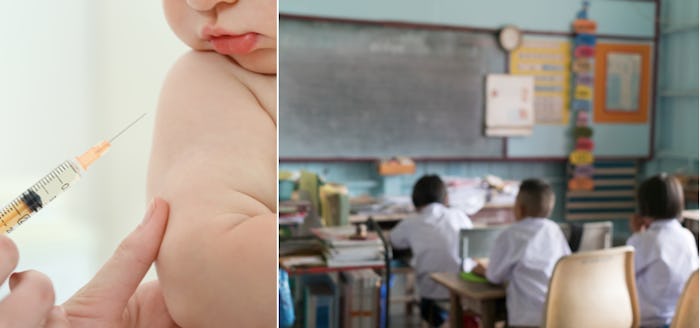Life
Schools In Italy Will Ban Unvaccinated Kids & Their Parents Could Face A Hefty Fine
Schools in countries around the world are cracking down on anti-vax parents in the wake of recent outbreaks of preventable diseases. One country in particular is taking a stark approach to mandating vaccines. As the BBC reported on Tuesday, unvaccinated kids will be banned from school in Italy and their parents could risk hundreds of dollars in fines if they don't comply.
The new Italian law — named the Lorenzin law after the former health minister who introduced it, according to local news reports — requires that children receive a number of mandatory immunizations before going to school, as The Local reported. Compulsory shots include vaccinations for chickenpox, polio, measles, mumps, and rubella. The Italian government is instructing parents not to send their children to school unless they have proof of vaccination, according to The New York Times.
Unvaccinated children up to the age of 6 will be banned from nursery and kindergarten classes. And while children between the age of 6 and 16 cannot be excluded from school, their parents face harsh fines —up to €500 (about $560) — if they do not comply with the required vaccination schedule, according to The Local.
The deadline for vaccine certification has been extended from March 10 to Monday, March 18 in order to give Italian families "time to catch up," as Health Minister Giulia Grillo told La Repubblica newspaper, the BBC reported. According to Newsweek, she described the rules simply as: "No vaccine, no school."
Perhaps unsurprisingly, not everyone is on board with such an aggressive and proactive stance on vaccination. Her critics and opposing political parties — the right-wing Northern League and the radical 5Star Movement, according to Politico — have vowed to repeal her reforms should they come to power. Northern League political leader Matteo Salvini tweeted his opposition, arguing that it should be left to parents to choose if and when they vaccinate. “Vaccination yes, obligation no," he wrote.
In an interview with European Scientist, Lorenzin said that those against her law are acting out of fear and misinformation: "These two large political forces are surfing the wave of fear and ignorance spread by blogs and anti-scientific sites. They have replaced their anti-state revolt with an anti-science approach."
As for how schools are implementing the law, the BBC reported that regional authorities are in control and have been going about it in different ways. For example, in Bologna, officials set letters to parents of roughly 300 children letting them know that their children were set to be suspended for not being up to date on vaccinations, as The New York Times reported. Other areas have reportedly been give a deadline extension for compliance.
While the methods may differ by area, the results as a whole have been promising. The Independent reported that the law intended to raise Italy's vaccination rate from less than 80 percent to the World Health Organization's recommended target of 95 percent. And as of Monday, the Italian health authority reported that as of March 10, the initial deadline for compliance, the national immunization rate has jumped to nearly 95 percent for children born in 2015, according to the BBC. There is some variation in percentiles between individual vaccines, but the number as a whole seems to suggest that Lorenzin's law is working.
The 95 percent recommended vaccination rate from WHO is based on the threshold for "herd immunity," when enough of the populations is protected to prevent the spread of disease that can impact those who are unable to be vaccinated, according to PBS.
As the law continues to be put into practice across the country, immunization rates are likely to continue to rise. Outlets have yet to report on consequences for noncompliant parents beyond suspension for children under 6 and fees for older children, so further resistance is also possible. Hopefully the efforts are enough to protect those unable to receive vaccinations themselves, as the initiative intended.
